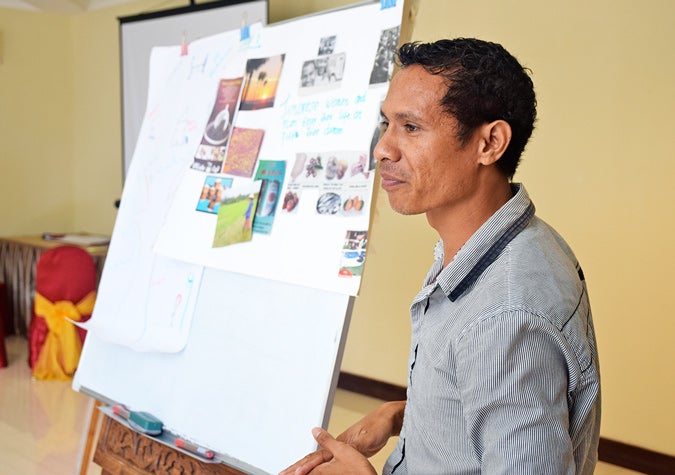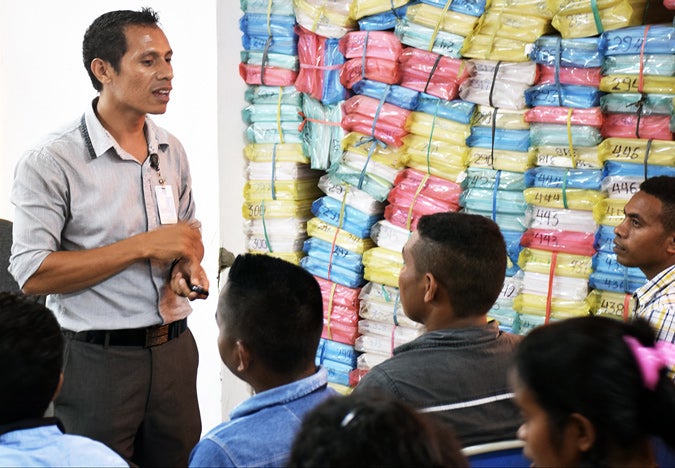Timor-Leste’s 2015 Census: Spreading the Word for Women
Date:
Author: Christina Yiannakis
On the 11th of July 2015, the General Directorate of Statistics (GDS) will launch Timor-Leste’s national Housing and Population Census in order to capture a full picture of the living standards of its citizens.
As Timor-Leste’s third population census since the restoration of its independence in 2002, the Government has an opportunity to monitor the nation’s development by comparing this year’s census data to information that was collected in the 2004 and 2010 censuses.

The key aim of any census is for a government to collect information from everyone residing within the nation to gain detailed data on age and sex distribution, marital status trends, fertility patterns, economic activity, employment statistics, and occupational and industrial distribution, among many other significant details. This snapshot guides governments in policy, service and infrastructure development.
Additionally, it can give a government a clear image of the differences in living standards between men and women by monitoring their health, work, education and access to services. However, information and data on women’s lives is often overlooked as a result of gendered assumptions made by enumerators and citizens, including the belief that women in a household do not work, and therefore are not worth counting.
Exemplary of this, the 2014 pilot census identified gaps in the data collection, reflecting a lack of understanding among enumerators of women’s work and the definition of female-headed households. To assist the Government of Timor-Leste eliminate this challenge, GDS staff have been working closely with UN Women and UNFPA to develop methods and campaign messages that will ensure that statistics are accurately collected, including on women’s lives.
While citizens of Dili, Timor-Leste’s capital city, have reliable access to electricity, television, radio, and internet services, the 70 per cent of the population living in rural areas are not as lucky. As such, an awareness raising campaign for the census must be conducted depending primarily on the work of individual messengers to enter rural communities to distribute advocacy materials and communicate the importance of an inclusive census.
To guarantee that the messengers and the general population know how important women’s involvement in the census is, GDS invited UN Women’s National Programme Officer for Gender Mainstreaming, Joao Soares, to conduct a training for the 65 messengers being sent to the districts.

Soares’ training message was simple: “It is important to involve women in the census.” Speaking enthusiastically in front of the group of messengers, Joao captured their attention by discussing the differences between the opportunities and experiences women and men face in their lives, and looking at the great strides the Government of Timor-Leste has made to address inequalities between the sexes through laws and international commitments, such as the Convention to eliminate all Forms of Discrimination Against Women (CEDAW).
Using women’s formal and informal employment as an example of why women must always be included, Soares explained, “Women’s work and lives must be correctly recorded in the census so that we can acknowledge women’s work and make their contributions visible.”
In a nation with strong ambitions to fulfil international commitments to gender equality, and where female participation in the workforce was recorded as 27 Per cent in the last census, the challenge of ensuring that the recording and acknowledgement of women’s work and economic contributions is completed correctly was met with nods of approval.
To support the effort GDS is pouring into the census campaign and the development of the messengers’ understanding of women’s issues during census data collection, training for the enumerators themselves is also being planned. This training will include exercises and information on the importance of a fully inclusive enumeration process, with materials to support their understanding of women’s work and household contributions.
As progress on the census campaign continues, the commitment of GDS to the accurate recording and full inclusion of women and disadvantaged members of society will help ensure that this year’s census captures detailed information of all citizens, highlighting their social and economic contributions to policy makers and beyond.